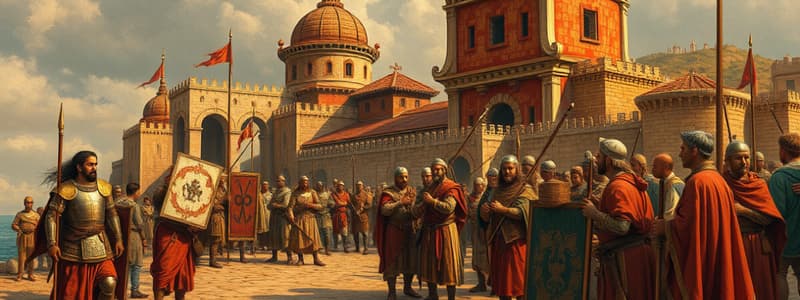Podcast
Questions and Answers
What were the Crusades primarily known for?
What were the Crusades primarily known for?
- Focusing on art and science
- Learning about the outside world (correct)
- Establishing Spanish colonies
- Discovering the New World
What does the term 'Renaissance' refer to?
What does the term 'Renaissance' refer to?
The age of Exploration
Who discovered the New World for Europeans?
Who discovered the New World for Europeans?
Christopher Columbus
Which regions did the Spanish colonies primarily cover?
Which regions did the Spanish colonies primarily cover?
What does 'Gold, Glory and God' refer to?
What does 'Gold, Glory and God' refer to?
What is mercantilism?
What is mercantilism?
Study Notes
Crusades
- Introduction of Europeans to the broader world, sparking interest in Asian goods.
- Crusaders reported back about silk, spices, and jewels, increasing demand for these commodities in Europe.
Renaissance
- Marked as the "Age of Exploration," shifting European focus from religion to worldly interests.
- Revival of Greek and Roman ideas fueled advancements in arts, sciences, and inventions.
Christopher Columbus
- Credited with discovering the New World for Europeans, initiating transatlantic exploration and colonization.
Spanish Colonies
- Included present-day Mexico, Central America, the majority of South America (excluding Brazil), the West Indies, and parts of the Southern and Western USA.
Gold, Glory, and God
- Symbolized the driving motives behind overseas exploration and the expansion of European powers from 1400 to 1750.
- "Gold" emphasizes the quest for material wealth through trade in spices, slaves, and precious metals.
- "Glory" reflects the competitive nature of European monarchies during the era.
- "God" denotes the influence of missionary zeal and Christian crusading efforts, particularly against non-Christian religions.
Mercantilism
- An economic theory aimed at enhancing the wealth of the mother country through a favorable balance of trade.
- Wealth was measured by the amount of gold possessed, with Spain emerging as the richest nation during this period.
Studying That Suits You
Use AI to generate personalized quizzes and flashcards to suit your learning preferences.
Description
This quiz explores the key events and figures in European exploration from the Crusades to the Renaissance. It highlights the motivations behind exploration, including the quest for wealth, glory, and religious expansion. Test your knowledge on Christopher Columbus and the impact of Spanish colonies on the New World.




